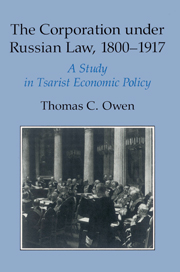Book contents
- Frontmatter
- Contents
- List of tables
- Preface
- Abbreviations
- The corporation under Russian law, 1800–1917
- 1 Zakon (The law), 1800–1856
- 2 Birzhevaia goriachka (Stock-exchange fever), 1856–1870
- 3 Proval reformy (The failure of reform), 1860–1874
- 4 Opeka (Tutelage), 1865–1890
- 5 Proizvol (Arbitrary acts), 1880–1905
- 6 Bezobrazie (Outrage), 1905–1914
- 7 Tupik (Dead end), 1914–1917
- 8 Autocracy, corporate law, and the dilemma of cultural delay
- Selected bibliography
- Index
- Studies of the Harriman Institute
3 - Proval reformy (The failure of reform), 1860–1874
Published online by Cambridge University Press: 22 September 2009
- Frontmatter
- Contents
- List of tables
- Preface
- Abbreviations
- The corporation under Russian law, 1800–1917
- 1 Zakon (The law), 1800–1856
- 2 Birzhevaia goriachka (Stock-exchange fever), 1856–1870
- 3 Proval reformy (The failure of reform), 1860–1874
- 4 Opeka (Tutelage), 1865–1890
- 5 Proizvol (Arbitrary acts), 1880–1905
- 6 Bezobrazie (Outrage), 1905–1914
- 7 Tupik (Dead end), 1914–1917
- 8 Autocracy, corporate law, and the dilemma of cultural delay
- Selected bibliography
- Index
- Studies of the Harriman Institute
Summary
To be sure, we see efforts to introduce reforms; commissions and subcommissions are appointed, and bills written; but these never reach the point of confirmation and implementation. This is the characteristic feature of the Russian bureaucracy: that bills prepared on every aspect of the law subsequently pass [directly] into the archive.
– Jozef Kaczkowski, legal historian (1908)The great surges in corporate activity after the Crimean War appear all the more impressive, notwithstanding the illegalities, absurdities, and excesses of the stock-exchange fevers, when we recall that no major reform of the corporate law of 1836 occurred to precipitate the rush to incorporation. In contrast to the Russian experience, some of the economic dynamism of Western Europe can be explained by the gradual loosening of the law to accommodate the needs of large-scale undertakings. By the early 1870s, after the great panic of 1873 had swept through the stock exchanges of London, Paris, and Vienna, fundamental differences between European capitalist institutions and those of the Russian Empire had become clear. In Europe, legislation to allow unstable corporations appeared less harmful than restrictions that would hobble the growth of the entire economic system, and if the occasional panics swept away the weakest firms, a resilient structure of corporate capitalism remained.
- Type
- Chapter
- Information
- The Corporation under Russian Law, 1800–1917A Study in Tsarist Economic Policy, pp. 55 - 78Publisher: Cambridge University PressPrint publication year: 1991



